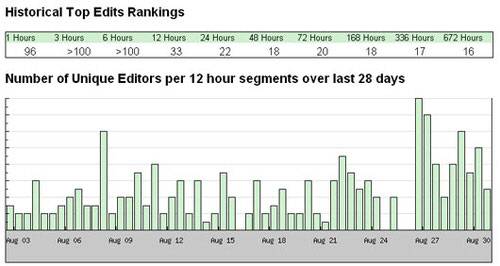At the beginning of this month, Andrew Pipes wrote about Yahoo! Buzz and Google Trends, two search engine zeitgeist tools that attempt to show what topics are popular based on search volume. The idea is that when you look at search data over time you begin to get a picture of how topics trend, and when you mash that data up with data about news mentions, you end up with with a picture of what’s important to people, when, and why.

Another site that could provide a window into what people are thinking about, is Wikipedia, the open encyclopedia. Because Wikipedia deals with such a wide array of topics and is kept so meticulously up to date, it would follow that things people are reading about the most are probably the most important topics in a given time period. Unfortunately, search and traffic data is unavailable on Wikipedia. Information about the number of edits made to article pages is available, however. With that in mind, web developer Craig Wood created Wikirage.
Wikirage is a zeitgeist based on the number of edits to Wikipedia articles. Wikirage shows the top 100 most edited articles over the past hour, 6 hours, day, 3 days, week, and month. For each topic in the top 100, the site also has a historical graph of edits for the past 4 weeks, as well as its relative ranking over time.

Wikirage is an interesting zeitgeist. While search or traffic data might be a better depictor of what’s hot, edits generally show which topics are either the most contentious or the most often changing (i.e., as a result of news). It would be great to see this data available for every Wikipedia page (not just those that crack the top 100) and mashed up with other data (like historical Technorati blog mentions, for example) so we could get some context about what is causing spikes in popularity. I.e., I would guess that edits to Fidel Castro’s page spiked last week following a rumor of his death posted on popular gossip blog Perez Hilton.
Via Webware.





















